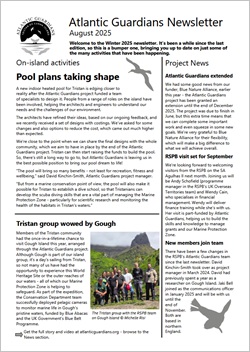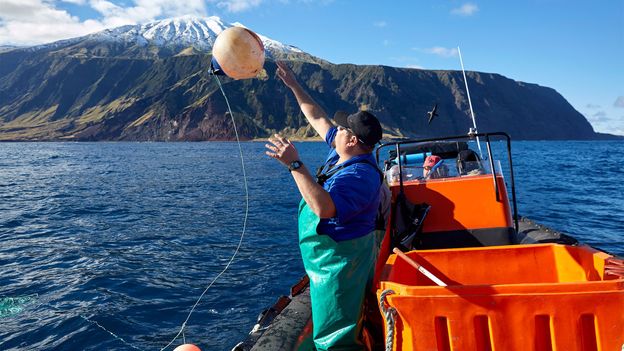News from the Atlantic Guardians Project and Tristan's MPZ
Atlantic Guardians NewsletterAs the Atlantic Guardians projects draws to a close, it has issued its August 2025 issue of its Newsletter with the following contents:
|
 |
|
Atlantic Guardians Newsletter, More information on the |
Tristan's Marine Protected Zone on the BBC
Writer Nick Schönfeld and photographer Julia Gunther recently spent ten months on Tristan and undertook a number of projects of a documentary nature. They talked about their work at the 2025 Tristan da Cunha Association Annual Gathering.
The latest product of their visit is a long and excellent article on Tristan's lobster fishing industry and the MPZ published by BBC Earth, entitled "Tristan da Cunha: The lobsters keeping Earth's remotest town afloat".

An illustration from the article of Fisheries staff setting equipment to monitor lobster stocks. Photo: Julia Gunther
The article, written by Nick and illustrated with photographs taken by Julia, goes through what happens during a typical Tristan fishing day, and highlights the importance of the lobster fishery to the island's economy and lifestyle. It is interwoven with snippets about what it is like living on Tristan, much of which will be recognisable to friends of Tristan, but some things will be unfamiliar and maybe even surprising.
There is a good summary of the measures being taken to preserve the fishery. Past problems with overfishing have been successfully overcome with regulation, effective monitoring of stocks, and strict conservation quotas. Nick also discusses Tristan's Marine Protected Zone (MPZ), and the challenges of policing it.
There are, of course, threats such as climate change and illegal industrial fishing. And then there are risks of environmental shocks that could affect the fishery, for example the Oliva shipwreck and the invasive species brought by the washed-up oil platform PXXI. The recently established ATBA (Areas to be Avoided) will help, but nothing is foolproof.
Nick and Julia are returning to Tristan on the 2025 Agulhas II voyage, and we can expect more to come.
